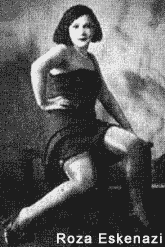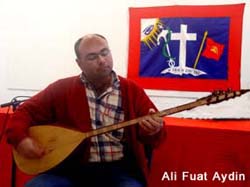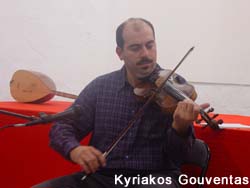|
Aegean Blues: musical minds meet to research rebetiko
 Francesco Martinelli spends some time on the island of Hydra
Francesco Martinelli spends some time on the island of Hydra
where the world gathered to review the history and share the music of Greece's historic rebel music.
Rebetika, rebetiko or rembetiko - the difference in spelling is an indication of how difficult is to understand the meaning of the word and trace its etymology - has been loosely defined as "the blues of the Aegean." There's a grain of truth behind this rather glib definition, since major social uprisings did influence the evolution of this music in the late '20s. Born as an all-male music of the Athens and Phyraeus underworld,
 and exemplified in the raw power of M�rkos Vamvak�ris' early recordings, the genre became one with the Caf� Aman style of female singers like Roza Eskenazi and Marika Papagika, and of the many schooled, technically proficient professional musicians who were among the over one millions Greek people who were forced to leave Anatolia (Asia Minor) within the "population exchange" between Turkey and Greece in the 20's.
The scars from this tragic and fascinating page of history are still fresh, and this is not the place to go into it in depth: suffice to say that among many other things a mutually developed musical culture which evolved over the centuries was disrupted and divided.
and exemplified in the raw power of M�rkos Vamvak�ris' early recordings, the genre became one with the Caf� Aman style of female singers like Roza Eskenazi and Marika Papagika, and of the many schooled, technically proficient professional musicians who were among the over one millions Greek people who were forced to leave Anatolia (Asia Minor) within the "population exchange" between Turkey and Greece in the 20's.
The scars from this tragic and fascinating page of history are still fresh, and this is not the place to go into it in depth: suffice to say that among many other things a mutually developed musical culture which evolved over the centuries was disrupted and divided.
Longing for the lost homeland, unaccepted by mainstream Greek culture and society (refugees numbered almost one fourth of the population of Greece then, and there was no way to provide shelter, jobs and food for all of them) Asia Minor musicians found themselves close to the underworld of the rebetes, a subculture based on a general rebellion against society, which adopted in language and music the convention of Muslim mystics, Sufis and dervishes. They also adopted the music and dance of the Zeybek, another group of rebels from the mountains of the Western Anatolia who challenged Ottoman society: multi-ethnic and multi-confessional, the Zeybek lived their own way, outside of society, respected and supported by the rural population. The zembekiko (9/8) rhythm forms the basis of the male solo dance of the rebetes, and originates in Anatolian folk music.
Vassili Tsitzanis is the recognized master of the mature, classic rebetico; his song "Cloudy Sunday," a truly haunting dirge in 9/8 inspired by a Byzantine hymn, became the unofficial national song in the 40's under the Nazi occupation, and modern Greek composers like Theodorakis and Hadjidakis acknowledge his influence.
But the story of the rebetiko is mainly the stories of hundreds of colorful, charming, tragic figures, from the rebetissas like Sotiria Bellou or Marika Ninou to the virtuosos of bouzouki and baglama, the two instruments that symbolize the genre. The curious English reader now has two excellent introductions to rebetika: Elias Petropoulos' "Songs of the Greek Underworld" (www.saqibooks.com) translated by Ed Emery and the pioneering work of Gail Holst, "Road to Rembetika" (published by Denise Harvey, GR-340 05 Limni, Evia, Greece / [email protected]). Rounder and other labels, especially English Heritage, also publish a number of collections that will hook any listener.
Largely unknown outside of Greece, and largely misrepresented in its own country, rebetika music is receiving again international attention in a systematic way thanks to the efforts of Ed Emery and his Institute of Rebetology.
The main effort of this grass roots organization is an international Weekend Conference called "Researching Rebetika" held on the Island of Hydra in the Saronikos Gulf in mid-October for the past three years.
Hydra is a truly beautiful place, beloved by artists and intellectuals for 50 years now. A long, mostly deserted island in the Saronikos Gulf, west of Athens, it can be reached with a 2 hour trip on a quick "flying Dolphin" from the port of Athens, so it's not recommended to use Hydra as a base for your visit to the Parthenon. If one manages to escape from the harborside during the daily visits of cruise ships full of tourists, Hydra in the off-season is very peaceful. Especially important is its sonic landscape; as Ed Emery says "the island has no motor cars, no motor scooters, no motor bikes. It is a place of quiet and calm - which means that singers and performers can make music in the streets without needing to use amplification. And that is our preferred way of hearing our music."
And it's true: you're welcomed with a donkey, used to carry your luggage up to the hotel, and the small village around the harbor looks positively heavenly. Some judicious searching will allow you to avoid the most blatant rip-offs for food and shelter; any shopping is discouraged, as the Athenian shops will offer the same stuff for half the price or even less. This includes the shops in the airport, where an indifferent cup of coffee cost three Euros.
The aim of the Conference is to combine academic research, performance and workshop sessions related to Greek music and Rebetiko in particular. Each year a sub-theme is chosen, this year it was "Women in Rembetiko."
 The organization is loose at best, but walking around the village you can't miss some of the fellow participants (who come from all over Europe and the USA), updating you on the next change of program. The non-amplified sound of the instruments was extremely pleasant in the meeting hall and in the informal restaurant sessions, so much so that it was well worth running to bed before the late session finished, just to fall asleep to the sound of acoustic instruments floating in through the window from the otherwise silent landscape.
The organization is loose at best, but walking around the village you can't miss some of the fellow participants (who come from all over Europe and the USA), updating you on the next change of program. The non-amplified sound of the instruments was extremely pleasant in the meeting hall and in the informal restaurant sessions, so much so that it was well worth running to bed before the late session finished, just to fall asleep to the sound of acoustic instruments floating in through the window from the otherwise silent landscape.
The Saturday night bash was over-amplified, and the music progressively slipped downwards; for many of the events some technical support (slides projection, or even a blackboard) would have helped to overcome the linguistic difficulties.
 Among the participants, the most impressive was the musicologist Markos Dragoumis, director of the Musical Folklore Archive of the Center of Asia Minor Studies, with his mini concert of piano arrangements of rebetiko song, each uniquely introduced with historical and musicological observation, but above all with human warmth and passion. Dragoumis also presented a study of the genesis of Vamvakaris's "Politissa," based on a folk song collected in the 1830s.
Among the participants, the most impressive was the musicologist Markos Dragoumis, director of the Musical Folklore Archive of the Center of Asia Minor Studies, with his mini concert of piano arrangements of rebetiko song, each uniquely introduced with historical and musicological observation, but above all with human warmth and passion. Dragoumis also presented a study of the genesis of Vamvakaris's "Politissa," based on a folk song collected in the 1830s.
All the presentations were at least somewhat interesting, and many truly absorbing. Maria Kotsiri introduced the "politiki laouta," a lute from Istanbul, and had an improvised session with Cengiz Onural from Istanbul on politiki lyra, or kemen�e. The Turkish contingent was completed by the unique voice of Ivi Dermanci, singer with the Kompania Ketencioglu, a rebetiko group operating in Istanbul and led by accordionist Muammer Ketencioglu,
by Ali Fuat Aydin from Izmir, who demonstrated zeybek songs on his divan saz, and by Cenk G�ray from Ankara, who took care of the historical-theoetical side. Italian group Calicanto with Roberto Tombesi and Francesco Ganassin presented a concert of traditional compositions of the Venice area and originals inspired by the wide network of connections among the towns all around the Adriatic and Mediterranean sea. The link with the theme of the meeting was very thin but the music was an exciting blend of traditional and contemporary, enriched by the jazzy phrases of clarinet player Francesco Ganassin, who also played several ocarinas.
Nadia Mintilogliti from London presented a well documented paper on rembetisses, maybe the most centered contribution to the meeting, and was equally at ease as a musician and singer in the improvised sessions. Jason Melissinos' Karaghiozis (shadow puppet show) was presented thoughout the meeting, with ad-hoc comments on the proceedings and a focus on the manges characters in the traditional show.
The famous Rebetiko Supper and concert at the Douskos Restaurant on Saturday night was overcrowded and again over-amplified, so the extraordinary musical personality of violinist Kyriakos Gouventas, demonstrated early in the afternoon with a personal introduction and an impromptu duet with Seattle fiddler Hank Bradley, was somewhat obscured. The musicians, especially Yiannis Alexandris and Antigone Bouna on ud, baglama and voice, were clearly excellent but the whole atmosphere of the evening was not conducive to the best musical experience.

Two movies were shown. "On A Moonless Night," directed by the French Luc Bongrand, is an account of rebetiko portrayed against the troubled history of post-war Greece, with truly moving original video clips, unfortunately cut rather short. The first draft of the documentary about the Hydra gathering itself by the Italian director Emilio Della Chiesa was also screened.
The meeting closed, appropriately enough, on a minor key, with a Sunday dinner in Hydra. I'm told that the Monday session in an Athens club was a success, so this unofficial adjunct to the meeting is becoming a tradition in itself.
The friendly atmosphere among the participants, the quality of the musicians, and the beauty of the context are such that I can't but recommend the whole experience: and after-Olympics Athens, in October 2004, will be hopefully at its best. - Francesco Martinelli
More information about the Hydra Gathering, including future plans, is available on their web site
|
Some recommended archival recordings:
1. Easily available internationally
- Rembetika - Historic Urban Folk Songs from Greece, Rounder 1079 / available at cdRoots
- Greek-Oriental Rebetica Songs And Dances In The Asia Minor Style, 1911-1937
Arhoolie/Folklyric CD 7005,(1991). Produced by Martin Schwartz www.arhoolie.com
- Rembetica In Piraeus 1933-1937 Heritage - HTCD 26
- Lost Homelands - The Smyrnaic Song In Greece 1928-1935. Heritage HTCD 27
2. Naturally the best choice is found in Greece. In fact the selection is
now bewildering, since the genre had several waves of revival. Rebetic
History (Rebetiki Istoria) published by EMI Greece in 6 volumes is the first
and still one of the best collections, and among the numerous publications
of archival recording on FM records the Greek Phonograph series began with
three excellent anthologies (Rembetiko in America) while a second similar
series contains these extraordinary volumes
- ANTHOLOGY OF REBETICO SONG VOL. 1 FM-654
- ANTHOLOGY OF REBETICO SONG VOL. 2 FM-655
- ANTHOLOGY OF SMYRNEAN SONGS VOL 1 FM-658
- ANTHOLOGY OF SMYRNEAN SONGS VOL 2 FM-659
www.fmrecords.net
3. Available in Turkey
- Rembetika 1918-1954, Kalan 008
- Rembetika II Kalan 054
Selected and introduced by Muammer Keten�oglu.
www.kalan.com
Some other recordings of interest:
- Roza Eskenazi Rembetissa, Rounder / available at cdRoots
- M�rkos Vamvak�ris Bouzouki Pioneer, 1932-1940, Rounder / available at cdRoots
- Cafe Rembetika: The birth of the Greek blues, Nascente, UK / available at cdRoots
- Calicanto / Labirintomare, CNI, Italy / available at cdRoots
- Grecia, de oriente y occide, Resistencia. 2 CD set includes rembetika classics as well as other contemporary and traditional music from Greece / available at cdRoots
Please note that a larger overview of available recordings is in the works for early in 2004. Check back for more.
|
|

